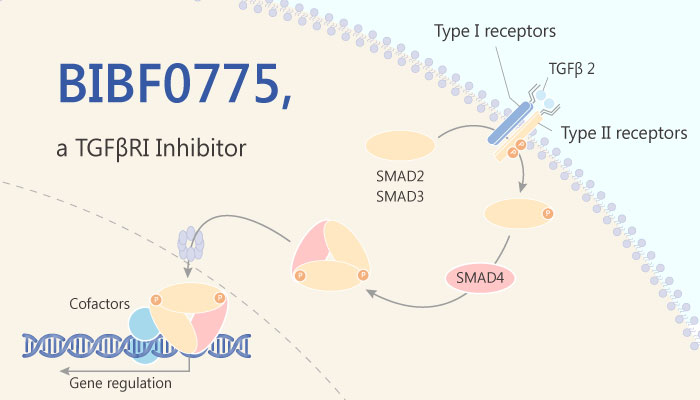Transforming growth factor β (TGFβ) is a pluripotent cytokine in the regulation of various biological processes. Inhibition of TGFβ type I receptor offers a novel approach for the treatment of fibrotic diseases and cancer. TGFβ upregulates the expression of adhesion molecules necessary for the recruitment of monocytes and neutrophils which both initiate inflammatory responses. Furthermore, TGFβ plays a pivotal role in the biosynthesis and turnover of extracellular matrix proteins like collagens, fibronectin, and proteoglycans. It is thus contributing to fibrosis and stimulation of smooth muscle cell proliferation. This suggests that inhibition of TGFβ signaling may provide a therapeutic potential in diseases like asthma and COPD.

Roth et al identified of indolinones as a novel chemotype for the inhibition of TGFβRI. Additionally, they performed a high-throughput screening of to identify inhibitors of the TGFβ receptor I. And among the hits, BIBF0775 and a few additional indolinone derivatives displays nanomolar potency in the TGFβRI assay. Furthermore, optimization of an initial lead compound BIBF0775 led to compounds. They showed potent TGFβRI inhibition with low cross-reactivity in the human kinome.
Besides, 6-Amido-substituted indolinones are potent inhibitors of the TGFβRI kinase. Selectivity of the compounds against other kinases is generally high. Depending on the particular compound substitution pattern, additional PDGFRR-inhibition is achievable. In contrast to many other known TGFβR inhibitors, particularly, p38 kinase is not inhibited by the indolinones. Of note, optimization of an initial lead furnished several compounds with inhibitory potencies against TGFβR1. For compounds with favorable lipophilicity, biochemical potency translated well into good cellular efficacy.
Reference:
J Med Chem. 2010 Oct 28;53(20):7287-95.